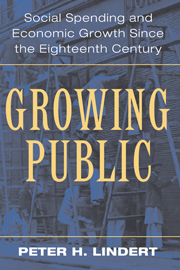Book contents
- Frontmatter
- Contents
- Preface to Volume I
- PART ONE OVERVIEW
- PART TWO THE RISE OF SOCIAL SPENDING
- PART THREE PROSPECTS FOR SOCIAL TRANSFERS
- PART FOUR WHAT EFFECTS ON ECONOMIC GROWTH?
- 10 Keys to the Free-Lunch Puzzle
- 11 On the Well-Known Demise of the Swedish Welfare State
- 12 How the Keys Were Made: Democracy and Cost Control
- Notes
- Bibliography
- Acknowledgments
- Index
10 - Keys to the Free-Lunch Puzzle
Published online by Cambridge University Press: 26 December 2009
- Frontmatter
- Contents
- Preface to Volume I
- PART ONE OVERVIEW
- PART TWO THE RISE OF SOCIAL SPENDING
- PART THREE PROSPECTS FOR SOCIAL TRANSFERS
- PART FOUR WHAT EFFECTS ON ECONOMIC GROWTH?
- 10 Keys to the Free-Lunch Puzzle
- 11 On the Well-Known Demise of the Swedish Welfare State
- 12 How the Keys Were Made: Democracy and Cost Control
- Notes
- Bibliography
- Acknowledgments
- Index
Summary
It is well known that higher taxes and transfers reduce productivity. Well known – but unsupported by statistics and history. This chapter dramatizes a conflict between intuition and evidence. On the one hand, many people see strong intuitive reasons for believing that the rise of national tax-based social transfers should have reduced at least GDP, if not true well-being. On the other, the fairest statistical tests of this argument find no cost at all. Multivariate analysis leaves us with the same warnings sounded by the raw historical numbers (back in Chapter 1). A bigger tax bite to finance social spending does not correlate negatively with either the level or the growth of GDP per capita. How can that be? Why haven't countries that tax and transfer a third of national product grown any more slowly than countries that devote only a seventh of GDP to social transfers?
The conflict between intuition and evidence can be explained with better tests and a closer look at institutions. Those well-known demonstrations of the large deadweight losses from social programs have overused imagination and assumption. There are good reasons why statistical tests keep coming up with near-zero estimates of the net damage from social programs on economic growth. It's not just that the tales of deadweight losses describe peculiarly bad policies. It's also that the real-world welfare states benefit from a style of taxing and spending that is in many ways more pro-growth than the policies of most free-market countries.
- Type
- Chapter
- Information
- Growing PublicSocial Spending and Economic Growth since the Eighteenth Century, pp. 227 - 263Publisher: Cambridge University PressPrint publication year: 2004



